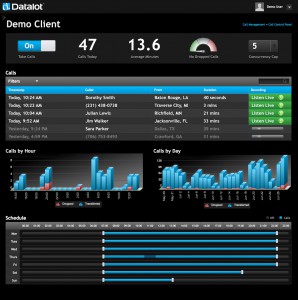Marketing Innovator Finds Calls Are Worth As Much As 10x More Than Clicks
Time to read: 4 minutes


A veteran of Internet advertising, Josh Reznick became intimately familiar with all manner of digital measurement when he founded his first online marketing company a decade ago. After selling that company, Reznick realized that in spite of all the innovation that had occurred with search and display advertising, there was still an enormous amount of friction in the process of transforming a person who clicked on an ad into a paying customer, especially when the product or service required some human interaction or a longer sales cycle.
In 2009, Reznick decided to found Datalot to remove that friction. He had a vision of combining the online marketing channel with the phone channel so that the information that was gathered about people while they were online wouldn’t be lost when they picked up the phone. Reznick’s goal was to use that information to identify the most valuable customers and to capture and share that value with other members of the marketing ecosystem, as well as to provide a far superior experience for the customer.
Reznick decided to build Datalot’s call generation and lead distribution infrastructure using the Twilio API because it was the most extensible of all the available telephony services. He liked that fact that he retained control of the data, as well as all decision logic, and that Twilio focused on providing straight-forward voice, SMS and VoIP services.

“Most of the other solutions required that you work within the confines of their service,” Reznick recalled. “That could have potentially limited what we wanted to build. Twilio just seemed like the better fit.”
Twilio’s flexibility made it possible for Datalot to quickly exceed Reznick’s initial vision. Today, Datalot doesn’t just blindly deliver leads, it uses a variety of internal and third-party data points to predict how much a particular lead is worth. The company shares that information with lead buyers and conducts a real-time auction for that lead.
One of Datalot’s most popular products is a self-service, on-demand call buying tool that makes it possible for a company to set up a bidding schedule with customized filters. “Let’s say you have a small insurance company with five reps,” Reznick said. “Two reps are available to take calls at any one time. They can log in and based on settings they control, like filters for geography or age, they can bid on calls that are coming in. They can set a schedule so that they only receive calls between 10 a.m. and 4 p.m. And they can also set a concurrency cap, for example of two calls, so that bids automatically shut off whenever there are two calls on the line.”
Although similar in concept to Google AdSense, Datalot provides publishers looking to monetize their traffic with a far more lucrative revenue share. A publisher of insurance-related information (one of Datalot’s popular lead categories) that might have yielded $4.50 in a revenue share from Google AdSense can get $50 or more from Datalot.

In addition, Datalot prides itself on providing transparency across multiple channels and interaction points. To help publishers continue generating higher-value traffic, Datalot shares traffic-optimization information about the actions users take. This can include the length of their calls with an insurance agent and whether or not they clicked on an email sent by an agent a few days later. If they did, the publisher gets paid again.
Reznick said Datalot has also had a lot of success providing publishers with dynamic call tracking numbers. Using Twilio, Datalot dynamically provisions 10,000+ numbers a month.

“A lot of times, publishers don’t have inbound phone numbers on any of their pages,” Reznick said. Datalot can assign them call tracking numbers, or they can use the service to generate their own. “Even if they don’t have their own phone reps, they can get paid any time we deliver a call to a buyer in our call auction,” Reznick said. “It’s super simple.”
Right now, Reznick said he is most excited about exploring the possibilities of Twilio Client, which provides all the functionality that Twilio offers at a lower price by transferring calls over the broadband network rather than the traditional telephone network. “We are building software that lets you run your entire sales center through the web browser, using Twilio as a back end,” Reznick said. “You just plug in a headset and you can start to field calls.”

Reznick imagines a day when a salesman is “off-duty” at his son’s Little League game, growing restless as the innings drag on. To pass the time, the salesman flips open his iPad, fires up Datalot, bids on a call and closes a deal. He gets a sales commission in 30 minutes, without stepping foot in the office.
That day, Reznick said, is rapidly approaching. “Servers and software aren’t the only things moving to the cloud,” Reznick said. “Skilled phone labor will be moving from centralized sales centers to a more distributed environment as well. Twilio has made it as easy as it can be for us to develop the awesome technology to power this shift.”
Want to learn more? Josh Reznick recently took part in the webinar, “Beyond PPC: 8 ways to increase conversions with call tracking.” You can watch it here.
Related Posts
Related Resources
Twilio Docs
From APIs to SDKs to sample apps
API reference documentation, SDKs, helper libraries, quickstarts, and tutorials for your language and platform.
Resource Center
The latest ebooks, industry reports, and webinars
Learn from customer engagement experts to improve your own communication.
Ahoy
Twilio's developer community hub
Best practices, code samples, and inspiration to build communications and digital engagement experiences.


